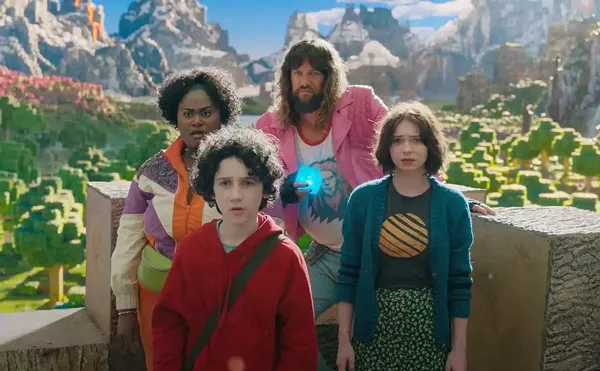
Audio By Carbonatix
[
{
"name": "GPT - Leaderboard - Inline - Content",
"component": "35519556",
"insertPoint": "5th",
"startingPoint": "3",
"requiredCountToDisplay": "3",
"maxInsertions": 100,
"adList": [
{
"adPreset": "LeaderboardInline"
}
]
}
]
Though the formula hasn't been perfected, the historic biopic has recently mutated into an interesting concoction of art-house affectation, actor showcase and blatant commercial interest. Consider last fall's Me and Orson Welles and this week's release of The Last Station. Both films take compelling historic celebrities — Welles and Tolstoy — cast them with Oscar-worthy actors, then sideline their icons as supporting players so more time's spent on the amorous complications of younger, more attractive acolytes (e.g. Zac Efron). It's an intriguing approach that recalls, of all things, the Marx Brothers' films, where Groucho and company were hilarious side players in an otherwise hokey romantic tale. And like those films, the protagonists aren't any more interesting.
James McAvoy plays Valentin Bulgakov, a cartoonishly chaste and hopelessly naïve follower of Tolstoy, who earns a position as the aging writer's secretary. Sent by Vladamir Chertkov (a mustache-twirling Paul Giamatti), he is also tasked to become a spy in the house of love ... or marital discord, as the case may be. You see, Tolstoy (Christopher Plummer) and his long-suffering wife, the Countess Sofya (Helen Mirren), are pitched in a battle of egos and politics. The famed novelist, who espouses pacifism, self-sacrifice and Christian anarchy, is being pressured by Chertkov to rewrite his will and bequeath all his work to the Russian people. Sofya, of course, is having none of this. Poor Valentin gets caught in the middle, just as love blossoms with a comely yet skeptical Tolstoyan named Masha (Kerry Condon).
The material is rich with possibilities, but writer-director Michael Hoffman is, unfortunately, not up to the task; the film struggles to find dramatic momentum, individual scenes drag beyond their ability to engage. Hoffman never establishes a consistent tone, bouncing between biting political commentary, refined biography and soapy melodrama. And the budding romance of Masha and Valentin is rendered in only the broadest strokes.
Hoffman can't decide whether Tolstoy is a wizened sage, contradictory kook or addled old man being manipulated by his exploitative entourage. From scene to scene, the Russian novelist's motives and rationale change to suit the script. That same wooliness undermines Sofya, who's calm and charming one moment, then explosively paranoid the next. Eventually, the seesaw of campy hysterics and noisy confrontations grows tiresome.
Luckily, Hoffman has Mirren and Plummer to sell his schizophrenic tale, providing the esteemed actors with a showcase for their talents. The 80-year-old Plummer brings crotchety grace to his confiding scenes with McAvoy, and finds genuine chemistry with the lusty Mirren — especially during a ridiculous bedroom romp, where the two rooster and cluck like hens. It's a touchingly intimate moment that demonstrates the couple's decades of attraction.
In the end, however, it's Mirren who dances away with the film (thus the Best Actress Oscar nom), constructing a dignified foundation for Sofya's melodramatic swooning. Counterbalancing her over-the-top freak-outs there's a carefully etched portrait of a wife desperate to hold onto the man she loves. In a wonderfully Chekhovian moment, the couple argues in front of guests at an outside luncheon. Furious with his wife's challenges and disgusted by the sound of his own voice, Tolstoy stomps off in a huff. Gently, Sofya soothes their dispute with opera played on a gramophone. It's a lovely scene, demonstrating that marriage is a complicated war of ego, affection and pride.
And there's the rub. From its depiction of the compromising politics of starting a "movement" to its understated commentary on celebrity media, there are enough smart and human moments in Hoffman's scattered film that you wish The Last Station were oh-so much more.
Opens Friday, Feb. 13, at Maple Art Theatre, 4135 W. Maple Rd., Bloomfield Hills; 248-263-2111.
Jeff Meyers writes about film for Metro Times. Send comments to letters@metrotimes.com.





